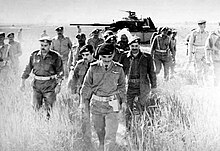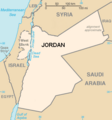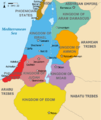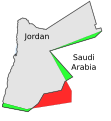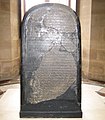Portal:Jordan
The Jordan Portal  Jordan, officially the Hashemite Kingdom of Jordan, is a country in the Southern Levant region of West Asia. Jordan is bordered by Syria to the north, Iraq to the east, Saudi Arabia to the south, and Israel and the occupied Palestinian West Bank to the west. The Jordan River, flowing into the Dead Sea, is located along the country's western border. Jordan has a small coastline along the Red Sea in its southwest, separated by the Gulf of Aqaba from Egypt. Amman is Jordan's capital and largest city, as well as the most populous city in the Levant. Modern-day Jordan has been inhabited by humans since the Paleolithic period. Three kingdoms emerged in Transjordan at the end of the Bronze Age: Ammon, Moab and Edom. In the third century BC, the Arab Nabataeans established their kingdom centered in Petra. Later rulers of the Transjordan region include the Assyrian, Babylonian, Roman, Byzantine, Rashidun, Umayyad, Abbasid, and the Ottoman empires. After the Great Arab Revolt against the Ottomans in 1916 during World War I, the Greater Syria region was partitioned by Britain and France. The Emirate of Transjordan was established in 1921 by the Hashemite, then Emir, Abdullah I, and the emirate became a British protectorate. In 1946, Jordan gained independence and became officially known as the Hashemite Kingdom of Jordan. The country captured and annexed the West Bank during the 1948 Arab–Israeli War until it was occupied by Israel in 1967. Jordan renounced its claim to the territory to the Palestinians in 1988, and signed a peace treaty with Israel in 1994. Jordan is a semi-arid country, covering an area of 89,342 km2 (34,495 sq mi), with a population of 11.5 million, making it the eleventh-most populous Arab country. The dominant majority, or around 95% of the country's population, is Sunni Muslim, with the rest being mostly Arab Christian. Jordan was mostly unscathed by the violence that swept the region following the Arab Spring in 2010. From as early as 1948, Jordan has accepted refugees from multiple neighbouring countries in conflict. An estimated 2.1 million Palestinian refugees, most of whom hold Jordanian citizenship, as well as 1.4 million Syrian refugees, were residing in Jordan as of 2015. The kingdom is also a refuge for thousands of Christian Iraqis fleeing persecution. While Jordan continues to accept refugees, the large Syrian influx during the 2010s has placed substantial strain on national resources and infrastructure. The sovereign state is a constitutional monarchy, but the king holds wide executive and legislative powers. Jordan is a founding member of the Arab League and the Organisation of Islamic Co-operation. The country has a high Human Development Index, ranking 99th, and is considered a lower middle income economy. The Jordanian economy, one of the smallest economies in the region, is attractive to foreign investors based upon a skilled workforce. The country is a major tourist destination, also attracting medical tourism due to its well developed health sector. Nonetheless, a lack of natural resources, large flow of refugees, and regional turmoil have hampered economic growth. (Full article...) Selected article -The Battle of Karameh (Arabic: معركة الكرامة) was a 15-hour military engagement between the Israel Defense Forces (IDF) and combined forces of the Palestine Liberation Organization (PLO) and the Jordanian Armed Forces (JAF) in the Jordanian border town of Karameh on 21 March 1968, during the War of Attrition. It was planned by Israel as one of two concurrent raids on PLO camps, one in Karameh and one in the distant village of Safi. After Jordan lost control of the West Bank to Israel in 1967, Palestinian fighters known as fedayeen moved their bases to Jordan and stepped up their attacks on Israel and Israeli-occupied territories, taking the border town of Karameh as their headquarters. The IDF claimed that the purpose was to destroy the fedayeen camps at Karameh, and to capture the leader of the PLO Yasser Arafat as reprisal. Israel also wanted to punish Jordan for its perceived support to the fedayeen. A large Israeli force launched an attack on the town on the dawn of 21 March, supported by fighter jets. Israel assumed the Jordanian Army would choose to not get involved in the battle, but the latter deployed heavy artillery fire, while the Palestinian irregulars engaged in guerrilla warfare. The Israelis withdrew, or were repulsed, after a day-long battle, having destroyed most of the Karameh camp and taken around 140 PLO members prisoner. (Full article...)Selected biography -Druze in Jordan refers to adherents of the Druze faith, an ethnoreligious esoteric group originating from the Near East who self identify as unitarians (Muwahhideen). Druze faith is a monotheistic and Abrahamic religion, and Druze do not identify as Muslims. The Jordanian Druze people are estimated to number at least 20,000, . The Druze, who refer to themselves as al-Muwahhideen, or "believers in one God," are concentrated in the rural, mountainous areas west and north of Amman. The Jordanian government classifies the Druze as Muslims. (Full article...)WikiProjectFor editor resources and to collaborate with other editors on improving Wikipedia's Jordan-related articles, see WikiProject Jordan. General images -The following are images from various Jordan-related articles on Wikipedia.
Selected city -Ajloun (Arabic: عجلون, ‘Ajlūn), also spelled Ajlun, is the capital town of the Ajloun Governorate, a hilly town in the north of Jordan, located 76 kilometers (around 47 miles) north west of Amman. It is noted for its impressive ruins of the 12th-century Ajloun Castle. The Ajlun Governorate has a population of over 176,080 widespread in 27 villages and towns over an area of about 420 km². The population is mainly composed of the Al-Qudah Muslim tribe. Even though most of the people in Jordan or Ajloun are Muslims there are in fact Christian tribes in Ajloun. Although Christians are a minority in the overall governorate, they form about less than half of the population in Ajloun city; most Christians reside in Ajloun city along with Muslims of the Al-Qudah tribe. Other tribes are distributed in the other districts of the governorate. (Full article...)
See also: List of cities in Jordan
Related portalsReligions in Jordan Arab states Other countries Recognized content
Featured articlesGood articles
TopicsSelected topic overview -
CategoriesSelected picture - The Al-Maghtas ruins on the Jordanian side of the Jordan River, believed by many to have been the location of the Baptism of Jesus and the ministry of John the Baptist.
Associated WikimediaThe following Wikimedia Foundation sister projects provide more on this subject:
SourcesDiscover Wikipedia using portals |

